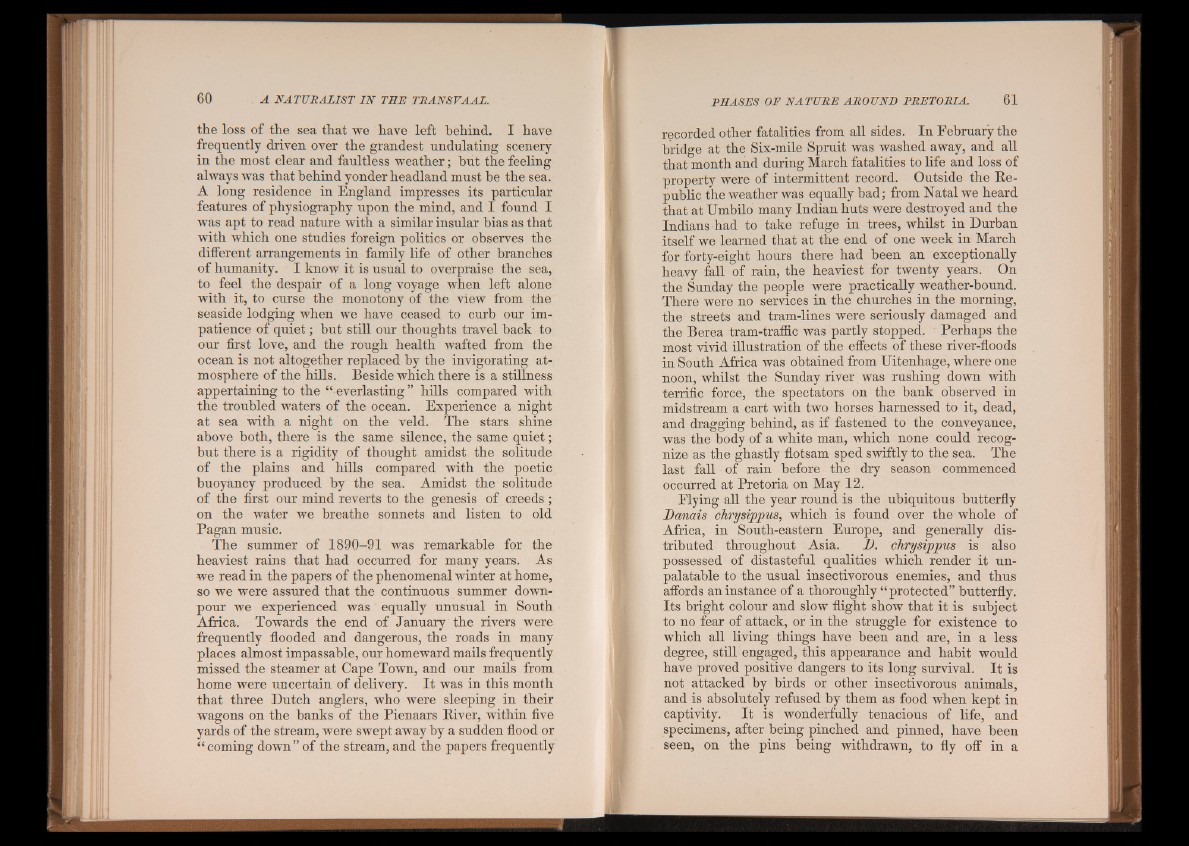
the loss of the sea that we have left behind. I have
frequently driven over the grandest undulating scenery
in the most clear and faultless weather ; but the feeling
always was that behind yonder headland must be the sea.
A long residence in England impresses its particular
features of physiography upon the mind, and I found I
was apt to read nature with a similar insular bias as that
with which one studies foreign politics or observes the
different arrangements in family life of other branches
of humanity. I know it is usual to overpraise the sea,
to feel the despair of a long voyage when left alone
with it, to curse the monotony of the view from the
seaside lodging when we have ceased to curb our impatience
of quiet ; but still our thoughts travel back to
our first love, and the rough health wafted from the
ocean is not altogether replaced by the invigorating atmosphere
of the hills. Beside which there is a stillness
appertaining to the “ everlasting ” hills compared with
the troubled waters of the ocean. Experience a night
at sea with a night on the veld. The stars shine
above both, there is the same silence, the same quiet ;
but there is a rigidity of thought amidst the solitude
of the plains and hills compared with the poetic
buoyancy produced by the sea. Amidst the solitude
of the first our mind reverts to the genesis of creeds ;
on the water we breathe sonnets and listen to old
Pagan music.
The summer of 1890-91 was remarkable for the
heaviest rains that had occurred for many years. As
we read in the papers of the phenomenal winter at home,
so we were assured that the continuous summer downpour
we experienced was equally unusual in South
Africa. Towards the end of January the rivers were
frequently flooded and dangerous, the roads in many
places almost impassable, our homeward mails frequently
missed the steamer at Cape Town, and our mails from
home were uncertain of delivery. It was in this month
that three Dutch anglers, who were sleeping in their
wagons on the banks of the Pienaars River, within five
yards of the stream, were swept away by a sudden flood or
“ coming down” of the stream, and the papers frequently
recorded other fatalities from all sides. In February the
bridge at the Six-mile Spruit was washed away, and all
that month and during March fatalities to life and loss of
property were of intermittent record. Outside the Republic
the weather was equally bad; from Natal we heard
that at Umbilo many Indian huts were destroyed and the
Indians had to take refuge in trees, whilst in Durban
itself we learned that at the end of one week in March
for forty-eight hours there had been an exceptionally
heavy fall of rain, the heaviest for twenty years. On
the Sunday the people were practically weather-bound.
There were no services in the churches in the morning,
the streets and tram-lines were seriously damaged and
the Berea tram-traffic was partly stopped. Perhaps the
most vivid illustration of the effects of these river-floods
in South Africa was obtained from Uitenhage, where one
noon, whilst the Sunday river was rushing down with
terrific force, the spectators on the bank observed in
midstream a cart with two horses harnessed to it, dead,
and dragging behind, as if fastened to the conveyance,
was the body of a white man, which none could recognize
as the ghastly flotsam sped swiftly to the sea. The
last fall of rain before the dry season commenced
occurred at Pretoria on May 12.
Flying all the year round is the ubiquitous butterfly
Danais chrysippus, which is found over the whole of
Africa, in South-eastern Europe, and generally distributed
throughout Asia. 1). chrysippus is also
possessed of distasteful qualities which render it unpalatable
to the usual insectivorous enemies, and thus
affords an instance of a thoroughly “ protected” butterfly.
Its bright colour and slow flight show that it is subject
to no fear of attack, or in the struggle for existence to
which all living things have been and are, in a less
degree, still engaged, this appearance and habit would
have proved positive dangers to its long survival. I t is
not attacked by birds or other insectivorous animals,
and is absolutely refused by them as food when kept in
captivity. It is wonderfully tenacious of life, and
specimens, after being pinched and pinned, have been
seen, on the pins being withdrawn, to fly off in a